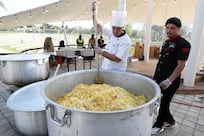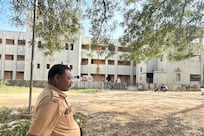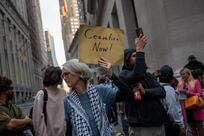ISLAMABAD // An anti-terrorism court judge has issued an arrest warrant for the former Pakistani military ruler Pervez Musharraf in connection with the 2007 assassination of the former premier Benazir Bhutto, state-run television reported.
The warrant is the latest legal trouble to face Mr Musharraf, a retired general and a one-time US ally who left Pakistan for Britain in 2008 after being forced out of the presidency he secured in a 1999 military coup. Despite his promises to return to Pakistan and lead a new political party, court motions against tMr Musharraf make it increasingly unlikely he will.
Along with issuing the warrant yesterday, Judge Rana Nisar Ahmad also ordered Mr Musharraf to appear before the court on February 19, Pakistan Television reported. Lawyers in the case could not immediately be reached for comment.
Bhutto was killed on December 27, 2007 in a gun attack and suicide bomb blast during a rally weeks after returning to Pakistan to campaign in new elections that Mr Musharraf reluctantly agreed to allow after months of domestic and international pressure.
It was not immediately clear on what basis the arrest warrant was issued. But many of Bhutto's supporters accuse the former president of intentionally not doing enough to ensure her protection, and trying to cover up government ineptitude in the case afterwards.
A spokesman for Mr Musharraf, Saif Ali Khan, told a private television channel that the former leader would defend himself before the court "at an appropriate time". He did not elaborate.
After her death, Bhutto's Pakistan People's Party rode a wave of public sympathy to garner the most seats in the February 2008 elections. Months later, the party forced Mr Musharraf to quit the presidency by threatening impeachment. He left for London later in the year and has since spent a good deal of time on the lecture circuit, including in the United States.
The United States backed Mr Musharraf for much of his military rule because he was, at least officially, an ally in the American-led war on global terrorism, and provided Washington assistance in pursuing militants who hid in Pakistan as they prepared attacks in neighbouring Afghanistan.
But domestic mistakes, including his attempts to fire the chief justice of the Supreme Court, pummelled his popularity, leading to mass protests that ultimately led Mr Musharraf to allow the new elections.
The new Pakistani president and head of the ruling People's Party is Asif Ali Zardari, Bhutto's widower. He also supports the US and has backed operations against militants on Pakistani territory.




